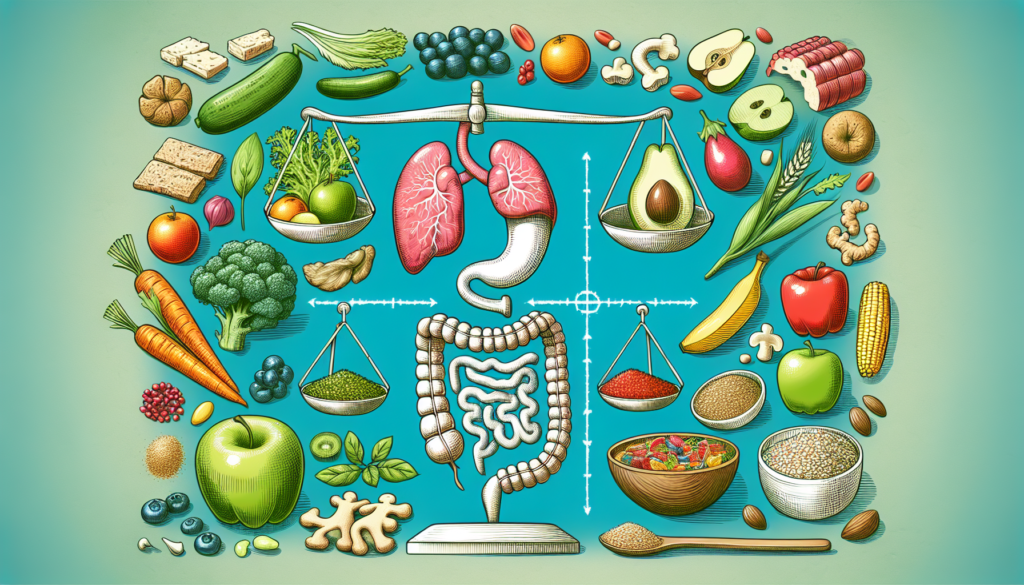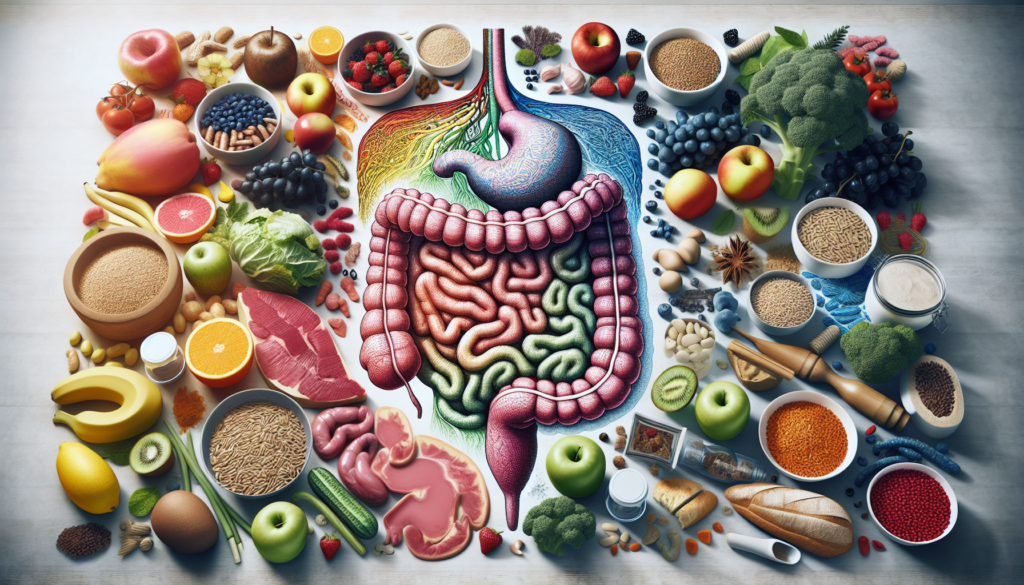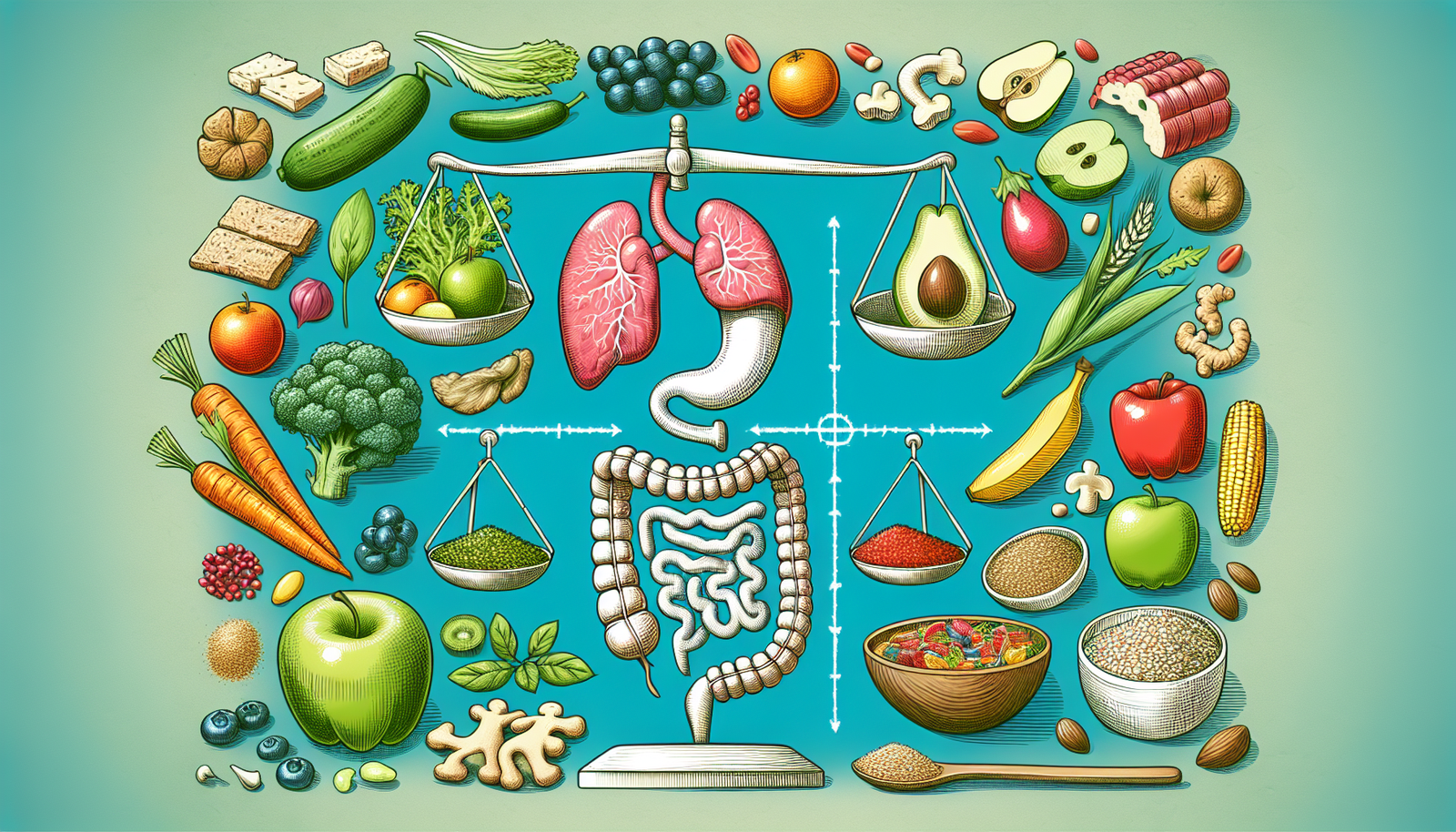Are you tired of dealing with digestive issues? Look no further! In this article, you will discover how you can improve your digestion through simple dietary changes. We all know how uncomfortable and frustrating digestive problems can be, but with the right approach to your diet, you can alleviate those pesky symptoms and start feeling better in no time. Say goodbye to bloating, gas, and indigestion, and say hello to a happier and healthier digestive system. So, let’s delve into the world of digestion and uncover the secrets to improving it through the power of food.

Understanding Digestion
The digestive system and its functions
The digestive system is a complex network of organs and processes that work together to break down food and absorb nutrients. It starts in the mouth, where food is chewed and mixed with saliva, and continues through the esophagus, stomach, small intestine, and large intestine. Additional organs such as the liver, pancreas, and gallbladder also play important roles in digestion.
The primary function of the digestive system is to convert food into usable energy and nutrients for the body. This includes breaking down complex carbohydrates, proteins, and fats into simpler forms that can be absorbed by the body. Digestion also involves the elimination of waste products from the body.
Common digestive problems
Digestive problems are incredibly common and can range from mild discomfort to more severe conditions. Some common digestive issues include:
-
Indigestion: Also known as dyspepsia, indigestion refers to a feeling of fullness or discomfort in the upper abdomen. It can be caused by overeating, eating too quickly, or consuming certain types of food.
-
Heartburn: A burning sensation in the chest, often accompanied by a sour taste in the mouth. This is caused by the regurgitation of stomach acid into the esophagus.
-
Constipation: Difficulty in passing stool or infrequent bowel movements. Constipation can be caused by a lack of fiber in the diet, dehydration, or certain medications.
-
Diarrhea: Loose, watery stools that occur more frequently than normal. Diarrhea can be caused by a viral or bacterial infection, certain medications, or food intolerances.
-
Irritable Bowel Syndrome (IBS): A chronic disorder that affects the large intestine. Symptoms can include abdominal pain, bloating, constipation, and diarrhea.
-
Gastroesophageal Reflux Disease (GERD): A chronic condition where stomach acid flows back into the esophagus, causing irritation and inflammation. This can lead to heartburn, chest pain, and difficulty swallowing.
It’s important to note that while dietary changes can often improve digestion, it’s always best to consult with a healthcare professional for an accurate diagnosis and personalized treatment plan.
Fiber: The Digestive Superstar
The importance of fiber in digestion
Fiber plays a crucial role in digestion and overall gut health. It is a type of carbohydrate found in plant-based foods that cannot be fully broken down by the body. Instead, it passes through the digestive system largely intact, adding bulk to the stool and promoting regular bowel movements.
Including an adequate amount of fiber in your diet can help prevent constipation and promote regularity. It also helps maintain a healthy weight, lower cholesterol levels, control blood sugar, and reduce the risk of certain diseases, including heart disease and colon cancer.
Different types of dietary fiber
There are two main types of dietary fiber: soluble fiber and insoluble fiber.
-
Soluble fiber: This type of fiber dissolves in water and forms a gel-like substance in the digestive tract. It can help lower cholesterol levels and regulate blood sugar levels. Good sources of soluble fiber include oats, barley, legumes, fruits, and vegetables.
-
Insoluble fiber: Insoluble fiber does not dissolve in water and adds bulk to stools, promoting regular bowel movements. It helps prevent constipation and maintains the health of the gastrointestinal tract. Whole grains, nuts, seeds, and the skins of fruits and vegetables are rich sources of insoluble fiber.
Fiber-rich foods to include in your diet
To increase your fiber intake, it’s important to include a variety of fiber-rich foods in your diet. Some excellent sources of fiber include:
-
Whole grains: Opt for whole wheat bread, brown rice, oatmeal, and whole grain pasta instead of refined grains.
-
Fruits and vegetables: Incorporate a rainbow of fruits and vegetables into your meals, as they are naturally high in fiber and packed with nutrients.
-
Legumes: Beans, lentils, and chickpeas are excellent sources of both soluble and insoluble fiber. Add them to soups, stews, salads, or as a side dish.
-
Nuts and seeds: Almonds, chia seeds, flaxseeds, and sunflower seeds are all good sources of fiber. Sprinkle them on salads, yogurt, or enjoy them as a snack.
By incorporating these fiber-rich foods into your diet, you can support healthy digestion and improve overall gut health.
Promoting a Healthy Gut Microbiome
What is the gut microbiome?
The gut microbiome refers to the community of microorganisms that live in your digestive tract. It is composed of trillions of bacteria, viruses, fungi, and other microbes.
The role of gut bacteria in digestion
Gut bacteria play a crucial role in digestion. They help break down and ferment certain types of carbohydrates that the body cannot digest on its own. This fermentation process produces short-chain fatty acids, which provide an energy source for the cells lining the colon.
Additionally, gut bacteria help regulate the immune system, produce certain vitamins, and protect against harmful pathogens. They also play a role in maintaining the health of the intestinal lining and preventing inflammation.
Ways to improve your gut microbiome
To promote a healthy gut microbiome, consider the following tips:
-
Eat a diverse range of foods: Consuming a varied diet rich in fruits, vegetables, whole grains, and fermented foods can help nourish different types of beneficial gut bacteria.
-
Include fermented foods: Foods like yogurt, kefir, sauerkraut, kimchi, and kombucha are rich in beneficial bacteria and can help populate your gut with good microbes.
-
Limit processed and sugary foods: These types of foods can promote the growth of harmful bacteria in the gut, leading to imbalances and potential digestive issues.
-
Consider probiotics: Probiotics are supplements or foods that contain live bacteria or yeasts that are beneficial for gut health. Discuss with your healthcare provider if probiotics are suitable for you.
By taking care of your gut microbiome, you can support healthy digestion and overall wellness.
Balancing Macronutrients
The role of carbohydrates, proteins, and fats in digestion
Carbohydrates, proteins, and fats are the three macronutrients that provide energy and perform essential functions in the body.
-
Carbohydrates: Carbohydrates are the body’s primary source of energy and are broken down into glucose during digestion. They are found in foods like grains, fruits, vegetables, and legumes.
-
Proteins: Proteins are essential for growth, repair, and maintenance of tissues in the body. They are broken down into amino acids during digestion and can be found in foods like meat, fish, dairy, legumes, and tofu.
-
Fats: Fats are a concentrated source of energy and are important for the absorption of fat-soluble vitamins. They are found in foods like oils, nuts, seeds, avocados, and fatty fish.
Choosing the right balance of macronutrients
A balanced diet should include a combination of all three macronutrients in appropriate proportions. The specific ratio of macronutrients needed can vary depending on individual needs, activity level, and health goals.
It is generally recommended to prioritize whole, unprocessed foods and focus on obtaining carbohydrates from complex sources like whole grains, fruits, and vegetables. Including lean sources of protein such as poultry, fish, and legumes is important for muscle repair and growth. Healthy fats from sources like avocados, nuts, and olive oil should also be included in moderation.
Macronutrient-rich foods to support digestion
To support digestion, incorporate the following macronutrient-rich foods into your diet:
-
Carbohydrates: Opt for whole grains, such as quinoa, brown rice, and whole wheat bread, as well as fiber-rich fruits and vegetables.
-
Proteins: Choose lean sources of protein like skinless poultry, fish, eggs, tofu, and legumes. These protein sources are easier to digest compared to fatty meats.
-
Fats: Include healthy fats from sources like avocados, nuts, seeds, and olive oil. These fats can help lubricate the digestive system and promote healthy bowel movements.
By maintaining a balanced intake of macronutrients, you can support optimal digestion and overall health.

Hydration for Digestive Health
The link between water and digestion
Water is essential for proper digestion. It helps dissolve nutrients and aids in the breakdown of food in the stomach and intestines. Water also helps move food through the digestive tract and prevents constipation.
Importance of staying hydrated
Staying hydrated is crucial for maintaining optimal digestion. When you are dehydrated, the body can’t produce enough saliva and the production of digestive enzymes is reduced, leading to inefficient digestion.
Additionally, proper hydration helps soften stools and prevent constipation. It also promotes the healthy function of the colon, preventing the buildup of waste and toxins.
Other hydrating beverages for digestion
In addition to water, there are other hydrating beverages that can support digestion:
-
Herbal teas: Ginger and peppermint teas can help soothe the digestive system and relieve indigestion.
-
Warm water with lemon: A glass of warm water with lemon in the morning can stimulate digestion and support detoxification.
-
Coconut water: Coconut water is a natural source of electrolytes and can help prevent dehydration.
-
Aloe vera juice: Aloe vera juice has a soothing effect on the digestive system and can help relieve symptoms of acid reflux or stomach irritation.
While hydrating beverages can contribute to overall digestive health, it’s important to prioritize water intake and listen to your body’s needs for optimal hydration.
Eating Mindfully
How mindfulness affects digestion
Mindful eating involves being fully present and aware of the entire eating experience, including the taste, texture, and smell of food. It can positively impact digestion in several ways.
Firstly, mindfulness promotes slower eating, which allows the body to properly chew and break down food. This leads to better digestion and nutrient absorption.
Mindful eating also helps reduce overeating by increasing awareness of hunger and fullness cues. By listening to your body’s signals, you can avoid the discomfort and digestive issues that come with overconsumption.
Tips for mindful eating
To incorporate mindful eating into your routine, try these tips:
-
Eat without distractions: Avoid eating while watching TV, working, or scrolling through your phone. Focus solely on the act of eating.
-
Chew thoroughly: Take the time to chew each bite of food thoroughly before swallowing. This aids in digestion and allows you to fully experience the taste and texture of your food.
-
Pay attention to hunger and fullness cues: Before eating, assess your level of hunger. During the meal, listen to your body’s cues to determine when you are comfortably full.
-
Savor each bite: Slow down and fully experience the flavors, textures, and smells of your food. This enhances the enjoyment of your meal and promotes mindful eating.
By practicing mindful eating, you can promote optimal digestion and develop a healthier relationship with food.
Probiotics and Digestive Health
What are probiotics?
Probiotics are live microorganisms that provide health benefits when consumed in adequate amounts. They are often referred to as “good” bacteria and can help restore the natural balance of bacteria in the gut.
The benefits of probiotics for digestion
Probiotics have been shown to have several benefits for digestion, including:
-
Improved gut health: Probiotics can help maintain a healthy balance of bacteria in the gut, which is essential for optimal digestion and nutrient absorption.
-
Relief from digestive disorders: Probiotics may help alleviate symptoms of digestive disorders such as irritable bowel syndrome (IBS), inflammatory bowel disease (IBD), and diarrhea.
-
Enhanced immune function: The gut is closely linked to the immune system, and probiotics can help support a healthy immune response, reducing the risk of gastrointestinal infections.
-
Reduced antibiotic-associated diarrhea: Taking probiotics alongside antibiotics can help prevent or reduce the occurrence of diarrhea, a common side effect of antibiotic use.
Probiotic-rich foods and supplements
Probiotics can be found in certain foods and supplements. Some probiotic-rich foods include:
-
Yogurt: Look for yogurt with live and active cultures, as these contain beneficial bacteria. Avoid yogurts with added sugars or artificial flavors.
-
Kefir: A fermented milk drink that is rich in probiotics. Kefir is similar to yogurt but has a thinner consistency.
-
Sauerkraut: Fermented cabbage that contains beneficial bacteria. Look for sauerkraut sold in the refrigerated section, as shelf-stable versions may not have live cultures.
-
Kimchi: A Korean fermented vegetable dish that is packed with probiotics. It is commonly made with cabbage, radishes, and spices.
Probiotic supplements are also available and can be helpful for those who may not consume enough probiotic-rich foods. It’s important to choose high-quality supplements and consult with a healthcare professional for guidance.
By incorporating probiotics into your diet, you can support digestive health and overall well-being.
Avoiding Trigger Foods
Common food triggers for digestive issues
Certain foods can trigger digestive issues in some individuals. While triggers can vary from person to person, some common culprits include:
-
Spicy foods: Spices like chili peppers, hot sauce, and curry can irritate the digestive system and worsen symptoms of heartburn and acid reflux.
-
Fatty foods: Greasy or fried foods can lead to indigestion, bloating, and discomfort, especially in those with a sensitive digestive system.
-
Highly processed foods: Foods that are heavily processed, such as fast food, packaged snacks, and sugary treats, often lack the nutrients necessary for optimal digestion.
-
Carbonated drinks: Carbonated beverages, including soda and sparkling water, can lead to gas and bloating in some individuals.
Foods to avoid or limit for better digestion
While everyone’s tolerance to certain foods is different, the following foods may be worth avoiding or limiting to promote better digestion:
-
Caffeine: Coffee, tea, and other caffeinated beverages can stimulate the digestive system and may contribute to acid reflux or stomach irritation in some individuals.
-
Artificial sweeteners: Sugar substitutes such as aspartame, saccharin, and sucralose can have a laxative effect and cause digestive discomfort in some people.
-
Highly acidic foods: Citrus fruits, tomatoes, and vinegar can trigger acid reflux or heartburn in susceptible individuals.
-
Gluten: For individuals with gluten sensitivity or celiac disease, avoiding gluten-containing grains like wheat, barley, and rye can help alleviate digestive symptoms.
Remember, it’s important to listen to your body and identify any specific triggers that may be causing digestive issues. Keeping a food diary can be a helpful tool in identifying patterns and pinpointing potential triggers.
The Impact of Stress on Digestion
The connection between stress and digestion
Stress can have a significant impact on digestion. When we experience stress, our bodies release stress hormones like cortisol, which can disrupt the normal functioning of the digestive system.
Stress can contribute to a range of digestive issues, including:
-
Increased stomach acid production: Stress can lead to an overproduction of stomach acid, contributing to heartburn, acid reflux, and ulcers.
-
Altered gut motility: Stress can affect the movement of food through the digestive tract, leading to symptoms such as constipation, diarrhea, or abdominal discomfort.
-
Changes in gut bacteria: Chronic stress can disrupt the balance of beneficial bacteria in the gut, potentially leading to imbalances and digestive problems.
Stress management techniques for better digestion
To promote better digestion and minimize the impact of stress on your digestive system, consider incorporating the following stress management techniques into your routine:
-
Exercise: Engaging in regular physical activity can help reduce stress and improve digestion. Aim for at least 30 minutes of moderate-intensity exercise most days of the week.
-
Meditation and deep breathing: Practicing mindfulness meditation and deep breathing exercises can help calm the mind and reduce stress levels.
-
Yoga or tai chi: These mind-body practices combine movement, breathwork, and meditation and can help alleviate stress and promote relaxation.
-
Prioritize self-care: Take time for activities that you enjoy and help you relax, such as reading, taking baths, spending time in nature, or engaging in hobbies.
It’s important to find stress management techniques that work best for you and make them a regular part of your routine. By effectively managing stress, you can support healthier digestion and overall well-being.
The Role of Physical Activity
How exercise affects digestion
Regular physical activity provides numerous benefits for digestion. Exercise helps stimulate the muscles in the digestive tract, promoting regular bowel movements and reducing the risk of constipation.
Exercise also increases blood flow to the digestive organs, enhancing their function and nutrient absorption. It can help alleviate symptoms of indigestion, including bloating and gas.
Best exercises for promoting healthy digestion
Incorporate the following types of exercises into your routine to promote healthy digestion:
-
Cardiovascular exercises: Activities like walking, running, swimming, and cycling help stimulate the muscles in the digestive tract and promote regular bowel movements.
-
Yoga: Specific yoga poses can help massage the abdominal area, improving digestion and relieving digestive discomfort. Some poses to consider include seated twists, child’s pose, and downward-facing dog.
-
Pilates: Pilates exercises focus on strengthening the core muscles, which can help improve digestion and support proper posture.
-
Stretching: Gentle stretching exercises can help relieve tension in the muscles surrounding the digestive organs, promoting optimal digestion.
Remember to consult with a healthcare professional before starting any new exercise regimen, especially if you have any existing medical conditions or concerns.
By incorporating regular physical activity into your routine, you can support healthy digestion and overall well-being.
In conclusion, improving digestion through diet involves understanding the functions of the digestive system, the role of fiber in promoting regularity, the importance of a healthy gut microbiome, balancing macronutrients, staying hydrated, practicing mindful eating, incorporating probiotics, avoiding trigger foods, managing stress, and engaging in regular physical activity. By implementing these strategies, you can support optimal digestion and overall gut health. Remember to listen to your body, consult with healthcare professionals when needed, and make gradual changes that work for you and your individual needs.

